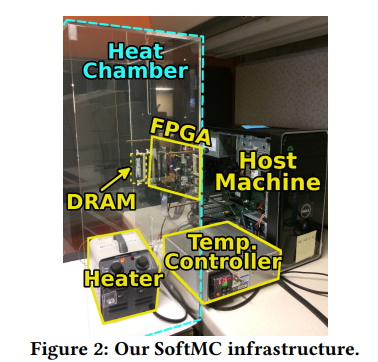SoftMC: A Flexible and Practical Open-Source Infrastructure for Enabling Experimental DRAM Studies

DRAM is the primary technology used for main memory in modern systems. Unfortunately, as DRAM scales down to smaller technology nodes, it faces key challenges in both data integrity and latency, which strongly affects overall system reliability and performance. To develop reliable and high-performance DRAM-based main memory in future systems, it is critical to characterize, understand, and analyze various aspects (e.g., reliability, latency) of existing DRAM chips. To enable this, there is a strong need for a publicly-available DRAM testing infrastructure that can flexibly and efficiently test DRAM chips in a manner accessible to both software and hardware developers. This paper develops the first such infrastructure, SoftMC (Soft Memory Controller), an FPGA-based testing platform that can control and test memory modules designed for the commonly used DDR (Double Data Rate) interface. SoftMC has two key properties: (i) it provides flexibility to thoroughly control memory behavior or to implement a wide range of mechanisms using DDR commands; and (ii) it is easy to use as it provides a simple and intuitive high-level programming interface for users, completely hiding the low-level details of the FPGA. We demonstrate the capability, flexibility, and programming ease of SoftMC with two example use cases. First, we implement a test that characterizes the retention time of DRAM cells. Experimental results we obtain using SoftMC are consistent with the findings of prior studies on retention time in modern DRAM, which serves as a validation of our infrastructure. Second, we validate two recently-proposed mechanisms, which rely on accessing recently-refreshed or recently-accessed DRAM cells faster than other DRAM cells. Using our infrastructure, we show that the expected latency reduction effect of these mechanisms is not observable in existing DRAM chips, which demonstrates the usefulness of SoftMC in testing new ideas on existing memory modules. We discuss several other use cases of SoftMC, including the ability to characterize emerging non-volatile memory modules that obey the DDR standard. We hope that our open-source release of SoftMC fills a gap in the space of publicly-available experimental memory testing infrastructures and inspires new studies, ideas, and methodologies in memory system design.
Publication Date
Research Area
External Links
Uploaded Files
Copyright
This material is posted here with permission of the IEEE. Internal or personal use of this material is permitted. However, permission to reprint/republish this material for advertising or promotional purposes or for creating new collective works for resale or redistribution must be obtained from the IEEE by writing to pubs-permissions@ieee.org.
